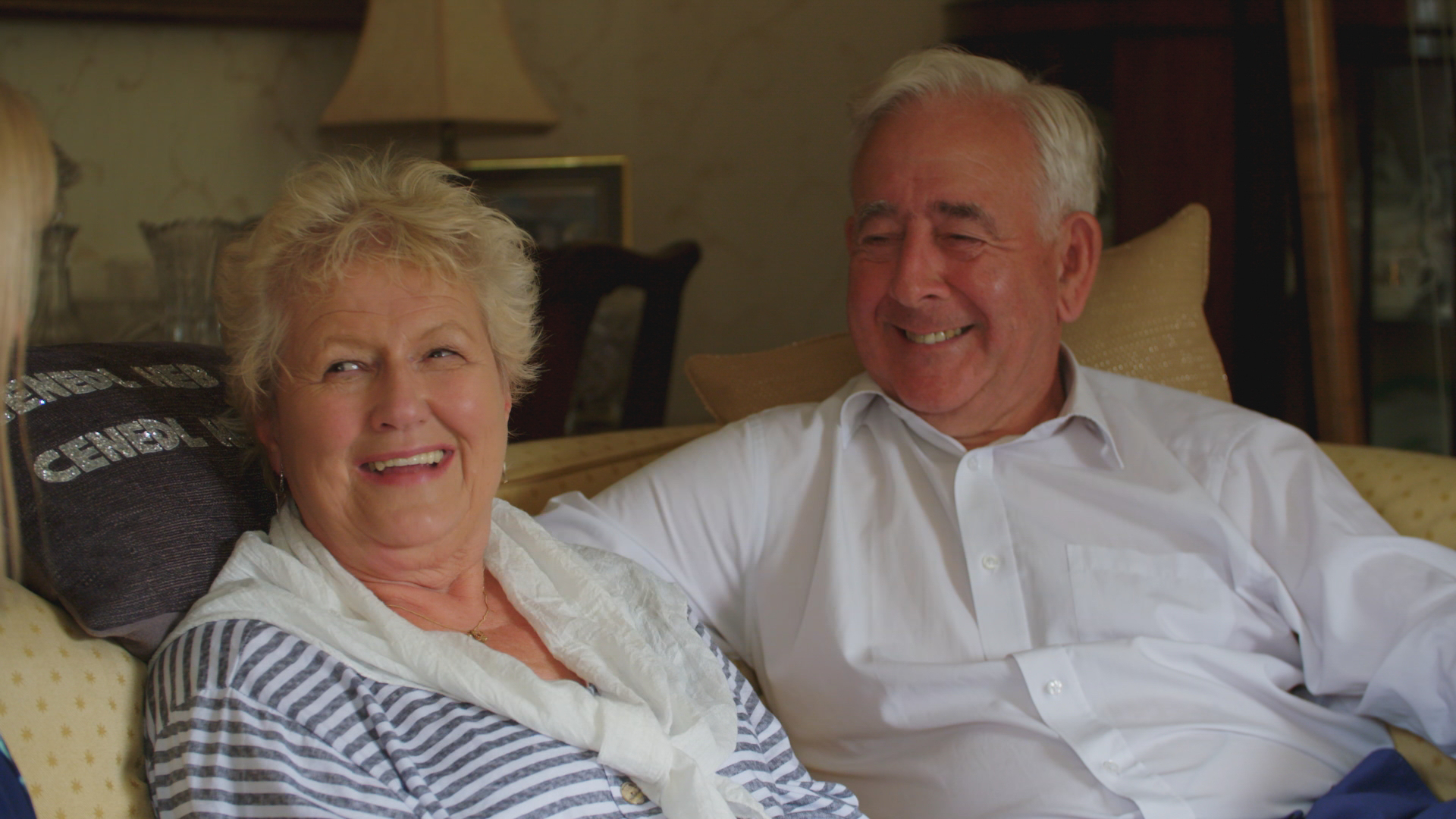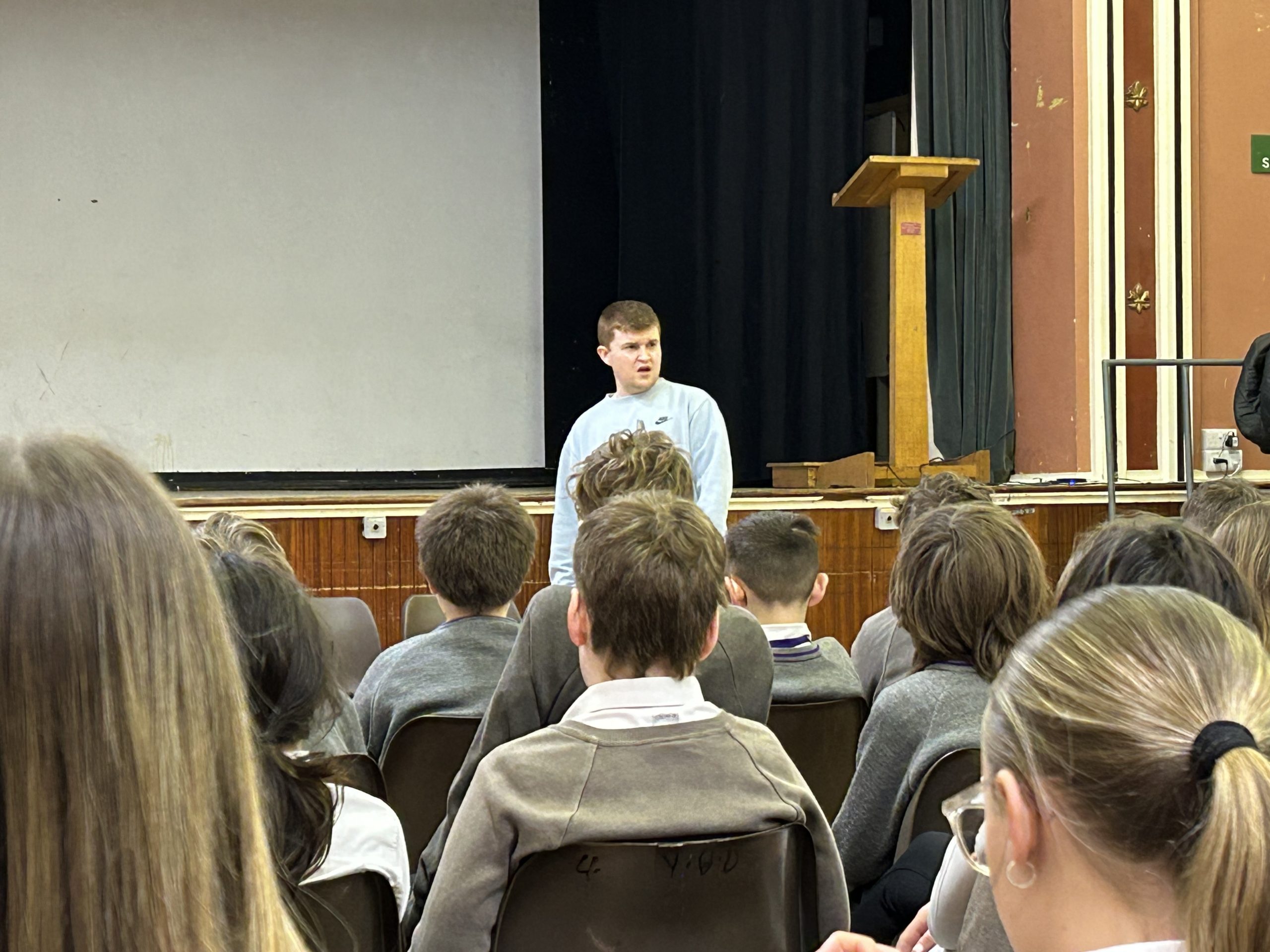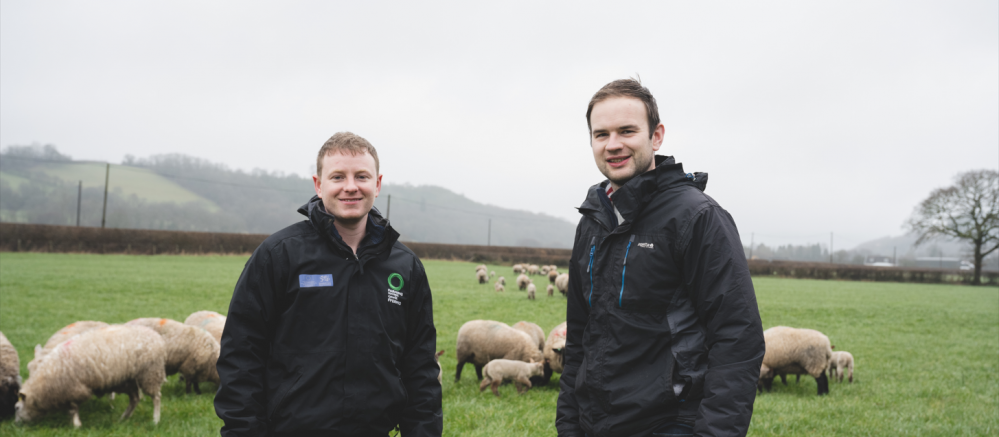Cymraeg
Eisiau dianc rhag hynt a helynt gwleidyddiaeth?

MAE HI’N anodd cadw trac ar yr holl newidiadau gwleidyddol sy’n digwydd o’n cwmpas. Does dim bwletin yn mynd heibio heb newyddion yn torri o Fae Caerdydd, San Steffan… neu hyd yn oed Washington, DC.
Ond ydi’r holl drafod gwleidyddol yn mynd yn drech?
Yr wythnos hon ar Adre, bydd Nia Parry yn cael cwmni un o wynebau amlycaf gwleidyddiaeth yng Nghymru a thu hwnt. Ond peidiwch â phoeni, cyfle i ddianc rhag hynt a helynt gwleidyddiaeth yw pennod yr wythnos hon, gan weld ochr wahanol i un o wleidyddion arloesol Cymru.
Nid yn unig un, ond bydd dau wyneb cyfarwydd yn croesawu Nia i’w cartref nos Fercher 30 Ionawr am 8.25 ar S4C. Power couple mwyaf eiconig ein dydd – na, nid Posh a Becks, a chwaith nid Jay Z a Beyoncé – ond Dafydd Wigley ac Elinor Bennett. Gyda’r ddau wedi ennill eu plwyf mewn meysydd sydd bellteroedd byd o’i gilydd, mae Nia am gael gwledd gerddorol a gwleidyddol yr wythnos hon ar aelwyd y cwpl yn Y Bontnewydd ger Caernarfon.
Yn gerddor heb ei hail, ac wedi rhyddhau pymtheg albwm ledled y byd, mae Elinor Bennett yn delynores amlwg sydd wedi meithrin sawl talent dros y blynyddoedd. A hithau wedi dathlu 50 mlynedd o briodas gyda’i gŵr Dafydd Wigley nôl yn 2017, tybed beth yw’r gyfrinach?
“Rhan amser! Mae Dafydd yn Llundain hanner yr amser,” chwardda Elinor, sy’n aml yn treulio ei hamser yng Nghaerdydd yn gwarchod ei hwyrion. “Bod yn nain ydi’r peth mwya’ pleserus yn y byd.”
A hithau yn ugain mlynedd eleni ers sefydlu Cynulliad Cenedlaethol Cymru, chwaraeodd Dafydd Wigley rôl holl bwysig yn yr ymgyrch i gael Cynulliad i Gymru. Yn ogystal, mae Dafydd yn eicon am ei gyfraniad calonogol tuag at hawliau pobl anabl, yn enwedig ei gyfraniad tuag at basio Deddf Personau Anabl 1981. Bydd Nia yn cyffwrdd â’r mater sy’n agos iawn at galonnau’r cwpl yn y rhaglen, gan iddynt golli dau o feibion oedd yn dioddef o anableddau difrifol.
“Tydi rhywun ddim yn llwyr ddod drwy golli plentyn – dydi o ddim yn dy adael di,” meddai Dafydd. “Nes i ddysgu llawer iawn am fyd anabledd o ganlyniad, a ges i gyfle yn y Senedd i weithredu ar hynny, a chael deddf 1981 trwodd yn seiliedig ar y profiad.”
“Wrth edrych nôl, mae rhywun yn sylweddoli erbyn rŵan fod pethau wedi agor llawer iawn mwy i bobl efo anableddau,” ychwanegodd Elinor, “roedd ‘na ryw fath o dabŵ nôl yn y saithdegau. Oedda’ ni isho bod yn agored, ac odd y ffaith fod Dafydd yn Aelod Seneddol yn golygu ei bod hi’n haws i ni fod yn agored.”
Ag yntau’n treulio llawer iawn o’i amser yn Llundain o hyd gyda’i sedd yn Nhŷ’r Arglwyddi, mae Dafydd Wigley wrth ei fodd yn cael dychwelyd o brysurdeb San Steffan i Ogledd Cymru. Gyda cherddoriaeth yn cael ei gweld fel ffordd arbennig o ymlacio, tybed a ydi taro tant ar un o nifer o delynau Elinor yn ddiddordeb ganddo?
“Yn anffodus, dwi’n gwbl angherddorol – dwi’n gadael yr ochr yna yn llwyr i Elinor. Ond dwi’n hoff iawn o wrando,” meddai Dafydd.
Yn hytrach, yn nes at natur mae ei hafan, yn yr ardd lysiau godidog sydd i’w gweld ar y rhaglen.
“Does ‘na’m dwywaith fod garddio’n therapi. Mae o’n le da i hel meddyliau,” meddai Dafydd.
Cymraeg
Hybu’r Gymraeg drwy sioe lwyfan

Ar faes Eisteddfod yr Urdd heddiw ym Meifod (29 Mai) caiff sioe lwyfan newydd ei dangos a fydd yn hyrwyddo’r Gymraeg i bobl ifanc ledled Cymru. Manon Steffan Ros sydd wedi creu’r sioe Geiriau i gwmni Mewn Cymeriad yn dilyn comisiwn gan Gomisiynydd y Gymraeg.
Bydd y sioe, sydd wedi ei hanelu at bobl ifanc ym mlynyddoedd 7, 8 a 9 ysgolion uwchradd, yn cyd-fynd â phecyn addysg newydd sydd wedi ei ddatblygu gan y Comisiynydd ac a fydd ar gael ar lwyfan addysgol, Hwb.
Yn ôl Manon Steffan Ros, roedd yn braf derbyn y cais i wneud y gwaith hwn er yn un heriol,
“Er mwyn hybu’r Gymraeg i’n pobl ifanc a’u hannog i’w defnyddio mae angen manteisio ar amryw o ffyrdd i wneud hynny. Mae sioe lwyfan, sydd yn mynd mewn i ysgolion, yn gyfle gwych i bwysleisio rôl y Gymraeg yn ein bywydau bob dydd, drwy ddefnyddio cerddoriaeth gyfoes a iaith sydd yn berthnasol iddyn nhw.
“Roedd yn her, serch hynny, i ddatblygu sgript a oedd yn cyfleu yr holl elfennau yma, tra ar yr un pryd yn hyrwyddo’r neges gyffredinol fod angen defnyddio’r Gymraeg er mwyn iddi oroesi.
“Gobeithio bydd y sioe yn gyfrwng i arwain at drafodaeth bellach ymysg pobl ifanc a’u hathrawon am bwysigrwydd y Gymraeg.”
I gyd-fynd â’r sioe, mae pecyn addysg wedi ei greu hefyd sydd yn cynnig amryw ddeunyddiau ar gyfer gwersi. Mae’r pecyn yn cynnwys cyflwyniadau ac atodiadau sydd yn rhannu gwybodaeth am y Gymraeg, ei phwysigrwydd fel sgil mewn bywyd bob dydd, ieithoedd lleiafrifol eraill ar draws y byd, yn ogystal ag egluro rôl Comisiynydd y Gymraeg.
Yn ôl Efa Gruffudd Jones., Comisiynydd y Gymraeg, y gobaith yw fod y gwaith hyn yn ymateb i angen,
“Rwyf wedi nodi yn aml fod plant a phobl ifanc yn flaenoriaeth i fi ac rydym yn gyson yn derbyn ceisiadau gan ysgolion am wybodaeth am ein gwaith. Y nod gyda’r pecyn hwn yw cynnig pecyn ymarferol y gellir dewis gweithgareddau ohono.
“Bydd hefyd, gobeithio, yn gymorth i athrawon a ddisgyblion ddeall yn well, nid yn unig rôl Comisiynydd y Gymraeg ond sefyllfa’r Gymraeg ar lefel genedlaethol a rhyngwladol.
“Gobeithio y caiff ei ddefnyddio’n eang.”
Un ysgol sydd wedi cael cyfle i weld y sioe eisoes yw Ysgol Bro Hyddgen ym Machynlleth yn nalgylch yr Eisteddfod. Mae Nansi Lloyd yn mlwyddyn 7 ac fe wnaeth fwynhau yn fawr,
“Roedd y sioe yn symud yn gyflym oedd yn grêt ac roeddem i gyd yn meddwl fod y defnydd o gerddoriaeth Gymraeg gyfoes yn dda iawn. Fe wnaeth i fi feddwl am pam mod i’n siarad Cymraeg a phwysleisio pa mor bwysig yw siarad yr iaith yn naturiol bob dydd, ac nid yn yr ysgol yn unig.
“Rwy’n gobeithio mynd i’w gweld eto yn yr Eisteddfod.”
Mae Alaw Jones yn athrawes yn ysgol Bro Hyddgen ac yn gweld gwerth yn y sioe a’r pecyn addysg,
“Mae yn medru bod yn heriol cyflwyno’r Gymraeg yn enwedig mewn oes lle mae cyfryngau cymdeithasol yn chwarae rôl mor flaenllaw yn mywydau pobl ifanc. Roedd y sioe hon yn gyfrwng i arwain ar drafodaeth bellach am y Gymraeg yn ein cymdeithas heddiw a braf oedd gweld ymateb y bobl ifanc i’r sioe.
“Mae’r pecyn addysg yn adnodd defnyddiol a fydd yn ein caniatáu i drafod y Gymraeg mewn cyd-destun ehangach, cyd-destun rhyngwladol, ac yn pwysleisio manteision siarad yr iaith o safbwynt sgil yn y byd gwaith.”
Caiff y sioe, Geiriau¸ ei pherfformio ar stondin Llywodraeth Cymru am 2pm ar ddydd Mercher, 29 Mai a bydd sesiwn holi ac ateb yn dilyn yng nghwmni Efa Gruffudd Jones, Manon Steffan Ros ac Owen Alun sydd yn perfformio’r sioe.
Cymraeg
Last ditch plea to HSBC to reverse decision to axe Welsh language phone line

AN MS has issued a last ditch plea to HSBC to reverse its “unacceptable” decision to axe its Welsh language phone service.
Llŷr Gruffydd, who represents North Wales in the Senedd, has spoken out as January 15, the date when the phone line is due to come to an end fast approaches.
The Plaid Cymru politician said executives at the baking giant still have an “opportunity to do the right thing”.
HSBC came under fire after politicians were informed of the bank’s decision to axe its Welsh language service by letter on Wednesday, November 8.
The Senedd’s Culture Committee wrote to the corporation accusing it of “contempt” towards Welsh speakers.
It added that its “failure to maintain an approach consistent with its values is considered disingenuous and disturbing”.
The committee also questioned statements made by José Carvalho, HSBC’s head of wealth and personal banking, who spoke in front of it on November 29.
The banker said that the Welsh-language helpline receives around 22 calls a day, and that the bank had ended up “with only 6% of the calls that are coming in being answered in Welsh” by them.
However, the committee hit back saying this indicates a fundamental failure of service by the bank because it means 94% of calls to the service are not being answered in Welsh,.
The Committee said that the “low number of calls” to the line “reflects” the bank’s “inability to provide a functioning and coherent service that meets the needs of its Welsh speaking customers.”
Llŷr Gruffydd said: “HSBC still has an opportunity to do the right thing by reversing its unacceptable and wrongheaded decision to bring its Welsh language phone service to an end.
“Executives at HSBC should remember that many customers use their banking services because of its Welsh language phone service.
“The bank argues that there isn’t sufficient demand for the helpline because it receives 22 calls a day on average.
“But it’s abundantly clear from the data that with only 6% of those calls being answered in Welsh, they’ve not been coming anywhere near to providing an adequate service.
“Phone calls that are made to the helpline in Welsh should be answered in Welsh. It’s no wonder that a lot of Welsh speakers have given up on phoning it.
“Instead of scrapping the service HSBC’s should invest in it properly for at least 12 months, and that includes ensuring that it is well-advertised. Then at the end of that period it could make a much better assessment of demand.
“The bank’s pledge to ‘arrange a call back in Welsh, within 3 working days is astonishingly disrespectful to Welsh speakers, as well as utterly insensitive to the financial pressures some people will face.
“For a significant number of people, accessing their bank through Welsh is not a ‘choice’ as HSBC claimed.
“HSBC say they ‘have confirmed that all customers can bank in English’, which is frankly an attitude that belongs to the last century. It is also untrue, especially for many elderly and vulnerable people.
“There is understandably a huge amount of anger and frustration right across Wales with HSBC’s general attitude towards the Welsh language.
“Recently I was contacted by a constituent who was quite rightly angry because she had been asked by a member of HSBC’s customer care team to resend a Welsh language query in English.
“That is one of many examples of HSBC’s complete and utter disregard for Welsh speakers.
“As a Welsh speaker myself and as a member of the Senedd’s Culture Committee, I share the real sense of frustration that’s out there.
“Many of their customers in Wales have also seen their local branches close over the last decade.
“The impact of this on their older customers is particularly acute, as well as those who don’t have access to digital technology.
“Though HSBC likes to describe itself as the world’s local bank, it is abundantly clear that this is not the case in Wales as it abandons Welsh speakers and abandons our high streets by shutting down local branches.”
Cymraeg
Ffermwr yn dysgu popeth y mae angen iddo wybod am ffermio modern drwy Cyswllt Ffermio

CYFLWYNODD ei rieni ef i ochr ymarferol ‘tir a da byw’ ffermio yn ifanc iawn, ond i Dylan Morgan, a aned yn Sir Gaerfyrddin, Cyswllt Ffermio sy’n rhoi’r wybodaeth ddiweddaraf i’r unigolyn yma a raddiodd mewn rheoli adeiladu. Dywedodd Dylan fod Cyswllt Ffermio wedi rhoi’r sgiliau a’r wybodaeth sydd eu hangen arno i fod y ffermwr ifanc blaengar a hyderus ydyw heddiw.
“A’r peth sy’n wych amdano yw, nad oedd rhaid i mi eistedd trwy oriau o ddarlithoedd theori amaeth am dair blynedd!”
Dywedodd Dylan mai agwedd Cyswllt Ffermio at ei holl wasanaethau hyfforddi a throsglwyddo gwybodaeth yw cyflwyno popeth ar y lefel gywir ar gyfer ffermwyr prysur ond profiadol sy’n gweithio.
“Mae’n ddull o ddysgu ar sail ‘angen gwybod’ sy’n apelio’n fawr ataf gan fy mod yn gallu gwneud lle iddo o amgylch fy nyletswyddau fferm ac ymrwymiadau eraill,” meddai Dylan.
Nid oedd gan Dylan unrhyw fwriad i ddod yn ffermwr pan adawodd Brifysgol Abertawe yn 2011, ond ar ôl ychydig fisoedd yn unig o ffermio’n llawn amser ar fferm bîff a defaid 360 erw ei deulu ger Llanymddyfri, newidiodd ei feddwl yn llwyr.
Roedd yn amlwg yn benderfyniad cywir i’r teulu cyfan ac mae Dylan (32) bellach wedi bod yn ffermio gartref ers bron i un mlynedd ar ddeg.
“Roeddwn i wastad wedi mwynhau helpu gartref pryd bynnag roedd gen i amser rhydd, felly roeddwn i wedi hen arfer ag ochr ymarferol ffermio, ond gan na astudiais i amaethyddiaeth yn y brifysgol, roeddwn i’n teimlo bod yna lawer nad oeddwn i’n ei wybod am iechyd anifeiliaid, pridd a rheoli glaswelltir a’r holl elfennau eraill o ffermio sy’n hanfodol i wella effeithlonrwydd ar y fferm.
“Mae’n hanfodol, fel ffermwyr, fod gan bob un ohonom y wybodaeth sydd ei hangen arnom a systemau yn eu lle i chwarae ein rhan i gadw at y safonau uchaf o les anifeiliaid, cynhyrchu da byw o’r ansawdd uchaf, gan hefyd warchod ein hamgylchedd naturiol a lleihau ein hôl troed carbon.”
Yn gefnogwyr hirdymor gwasanaeth Cynghori Cyswllt Ffermio, a welodd Dylan, ei dad a ffermwyr lleol eraill yn cael cyngor ar faterion yn cynnwys cynllunio rheoli maetholion, archwiliadau carbon a rheoli glaswelltir, mae Dylan yn rhoi llawer o’i amser hamdden i’w ddatblygiad personol.
Gan ddibynnu’n drwm ar ei swyddog datblygu lleol, Alun Bowen, i roi’r wybodaeth ddiweddaraf iddo am yr hyn sydd ar gael, mae Alun wedi cyfeirio Dylan – yn aml yng nghwmni ei dad – at nifer o weithdai iechyd a lles anifeiliaid ar bynciau’n amrywio o ffrwythlondeb y ddiadell a cholledion wyna i wneud y mwyaf o gynhyrchiant buchod sugno, cloffni a rheoli tir. Mae Dylan hefyd wedi dilyn cyrsiau hyfforddi byr â chymhorthdal ac mae’n defnyddio ystod gynhwysfawr y rhaglen o fodiwlau e-ddysgu a ariennir yn llawn yn rheolaidd.
“Mae dysgu ar-lein, mewn cyfnodau byr o 20 munud, gyda chwis ar ddiwedd pob modiwl i sicrhau eich bod wedi cymryd yr holl wybodaeth allweddol i mewn, yn ffordd wych o gynyddu eich gwybodaeth.”
Mae Dylan wedi canolbwyntio’n bennaf ar bynciau iechyd anifeiliaid yn ogystal â rheoli pridd a glaswelltir oherwydd ei fod yn credu’n gryf mewn mabwysiadu agwedd gyfannol at y fferm, gydag ‘arfer gorau ym mhopeth a wnawn’ yn rhan o’u hagenda cynaliadwyedd.
“Diolch i fy ngwybodaeth a sgiliau newydd a thrwy weithredu rhai o’r systemau newydd rydym wedi dysgu amdanynt trwy Cyswllt Ffermio, rydym bellach yn bwydo’r stoc yn llawer mwy effeithlon.
“Mae hyn wedi lleihau ein mewnbynnau’n sylweddol wrth wella perfformiad stoc a chynhyrchiant ac rydym hefyd wedi lleihau lefelau cloffni.”
Mae’r teulu’n sgorio cyflwr y corff yn rheolaidd ac yn meincnodi eu holl stoc ac yn dweud bod cyfrif wyau ysgarthol a phrofi elfennau hybrin trwy Cyswllt Ffermio wedi rhoi gwybodaeth werthfawr iddynt sy’n golygu eu bod wedi lleihau eu dibyniaeth ar driniaethau gwrthlyngyrol drwy fabwysiadu dull wedi’i dargedu’n well.
Gyda’i holl gyflawniadau dysgu wedi’u storio ar-lein yn ei gofnod personol y Storfa Sgiliau, mae Dylan yn dweud bod y system yn ffordd ddefnyddiol o nodi unrhyw feysydd y mae’n dal eisiau dysgu amdanynt.
“Mae ffermio yn ddiwydiant sy’n esblygu ac felly mae angen i ffermwyr o bob cenhedlaeth wybod eu bod yn ddigon gwybodus i wynebu’r cyfleoedd a’r heriau sydd o’u blaenau.”
Mae Cyswllt Ffermio yn cael ei ddarparu gan Menter a Busnes a Lantra Cymru a’i ariannu gan Lywodraeth Cymru a Chronfa Amaethyddol Ewrop ar gyfer Datblygu Gwledig.
I gael rhagor o wybodaeth am holl wasanaethau cymorth a hyfforddiant Cyswllt Ffermio ewch i https://businesswales.gov.wales/farmingconnect/cy neu ffoniwch eich swyddog datblygu Cyswllt Ffermio lleol.
-

 Education5 days ago
Education5 days agoMilford Tesco worker achieves Oxford dream and lands top legal job
-

 Crime4 days ago
Crime4 days agoHaverfordwest man admits having nearly 1000 child and animal images
-

 Crime4 days ago
Crime4 days agoYouth set to appear in court over serious sexual offences
-

 Crime4 days ago
Crime4 days agoPolice investigating after man injured during altercation in cemetery
-

 Education4 days ago
Education4 days agoPupils delight in ice cream treat from Pembrokeshire’s number one van
-

 Crime4 days ago
Crime4 days agoTown centre ‘stinking of skunk’ as police strip cannabis farm
-

 Crime3 days ago
Crime3 days agoFag-butt police court summonses spark debate in Pembrokeshire
-

 News6 days ago
News6 days agoProposal to give firefighters a council tax discount to go to Cabinet































